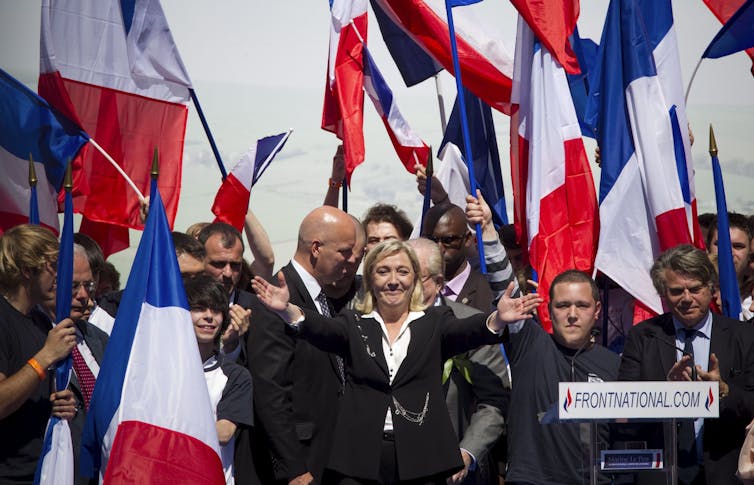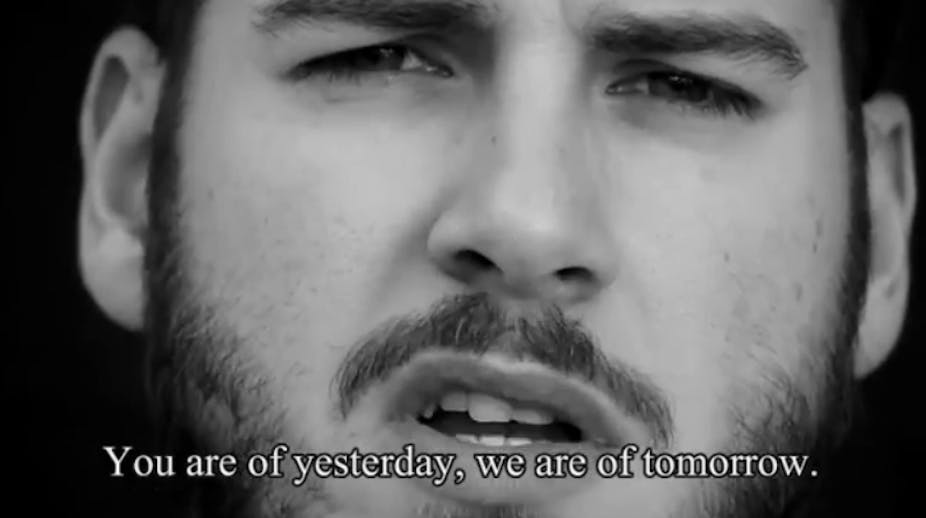Last month, about 70 activists of Generation Identitaire (GI) occupied the site of the unfinished Poitiers Grand Mosque. They unfurled a banner that read, “732 Generation Identitaire”, and asked for a referendum on halting Islam and immigration into France.
The action was not without precedent, nor was it without warning.
GI launched its two and a half minute “Declaration of War” on YouTube on the 4th of October. The “declaration de guerre” features an array of young faces denouncing the legacy of the French left radicals of 1968. They paint a picture of anti-white racism, the deliberate destruction of French traditions, failed multiculturalism, pointless foreign wars, and a parlous economic future.
The narrative is emotionally driven and gives no details of the conflict to be. It can only be assumed the Poitiers occupation was the first act in their war.
The first sortie in the media war
The year 732 is historically significant. It is the year the Frankish king, Charles “The Hammer” Martel, defeated the invading Moors near Poitiers. It is a victory considered to be a defining moment in the defence of Europe against an expansive Islam.
The choice of the Poitiers Mosque and the evocation of the memory of Charles Martel are in accord with the previous acts of strategic provocation and nativist protest of the GI’s parent movement, the Bloc Identitaire (BI).
The BI apply similar methods to provocateurs like People for the Ethical Treatment of Animals (PETA) or US pro-life protesters who engage in contentious and sometimes illegal direct actions and non-violent protests in the attempt to set a media agenda. Protests designed to gain attention have been the identitairians’ weapon of choice in their battle for an ethno-regionalist France, and ultimately Europe.
The BI have been engaged in actions designed to raise awareness since the movement’s inception in 2003. The most internationally significant of these was the 2010 Sausage and Wine parties designed to draw attention to the Muslims illegally praying on the streets of Paris, and define a sharp difference between the alcohol and pork-laden tradition cuisine of France and the absence of both in Islam.
The parties made international news when they were banned by the police, who considered them a racist provocation. According to the BI they drew attention to the Muslim’s illegal street prayers, an issue adopted by right wing politician Marine Le Pen in the recent presidential election.
The Front National and identitarians
The evolution of the Under Marine Le Pen, the Front National has moderated its message and now stands as a party that often oscillates between ethnic and civil nationalism. Le Pen’s public utterances are anti-globalist and staunchly in support of the secular republic against the perceived religious fervour of elements of Muslim populations.
Though they invoke many of the same themes, the identitarians have a diverse array of influences: non-Marxist socialists, Italian communist Antonio Gramsci’s approach to hegemony and meta-politics, Catholic social teaching, Swiss style direct democracy and the French “New Right”.
Unlike the Front National, they do not place primacy on the centralised French state and identity, but rather the “organic”, polycentric regional ethnicities of France, whether Breton, Alsatian, or Basque. There is an allegiance to France, but more importantly an allegiance to the continent, in accord with the Europe of a 100 Flags as advocated by the Breton nationalist, Yann Fouéré.
In fact, the youngest of the Le Pen political dynasty, Marion Marechal Le Pen, reportedly refused to attend the 2012 BI convention due to their regionalism and Europeanism.

The BI have allied with other nativist-regionalist movements, like the Flemish Interest, the Lega Nord and the Platform for Catalonia. These groups share a desire to evolve and strengthen their own stateless ethnic identities while maintaining a critical focus on the perceived danger of Islam to Europe in general and their “ethno-nations” in particular.
The identitarians are eager to consolidate their place in the self-defined “counter-jihad movement”.
A better tomorrow?
The identitairians aim to spread their “European versus Islam” narrative with cutting edge modes of communication. Adhering to the Gramscian notion that a cultural war must be engaged in prior to revolutionary change, they have consciously developed a nativist counter culture complete with ideology, symbols and aesthetics.
They combine social media, guerrilla advertising with a historical trajectory that places them as defenders of an “organic” Europe against a perceived demographic jihad. Whether as Spartans against the Persians, Frankish warriors against the Moors, or Venetian sailors against the Ottomans, the idenitarians are eager to present themselves as the next in the long line Europe’s staunchest defenders.
Media ‘reconquista’
Due to the economic problems facing much of Europe, the apparent tension surrounding Islam and immigration, and popular criticism of the EU, it’s likely BI and GI will engage in future acts of strategic provocation. In terms of media exposure, the mosque occupation has been a success. Denunciations from major political figures only magnify their cause.
They sense a repressed anger at political and media elites in France, around issues of immigration, Islam, globalisation and the centralised French state. The BI and GI hope to be a lightning rod for such feelings.

